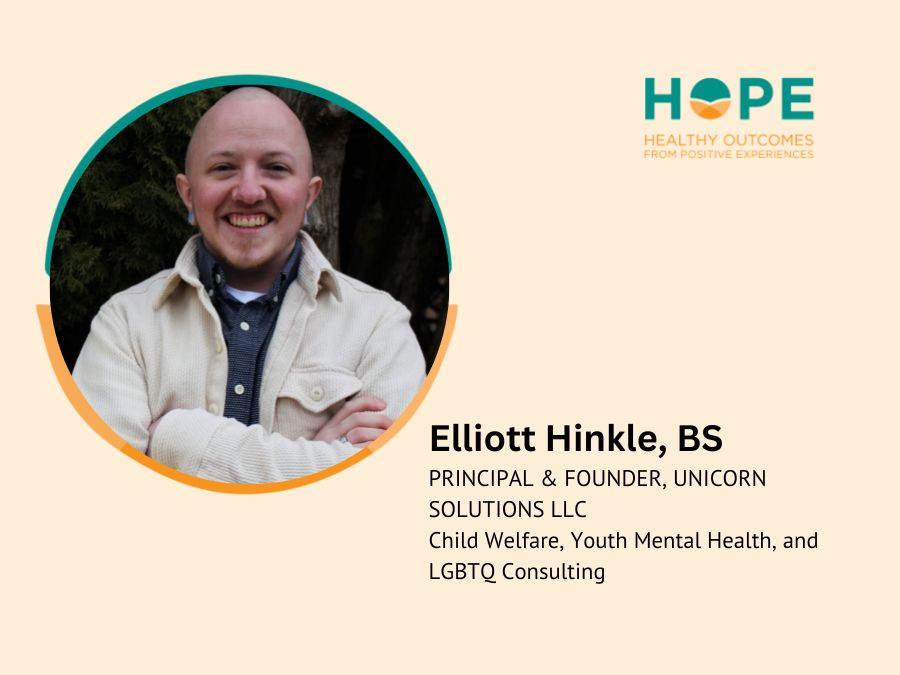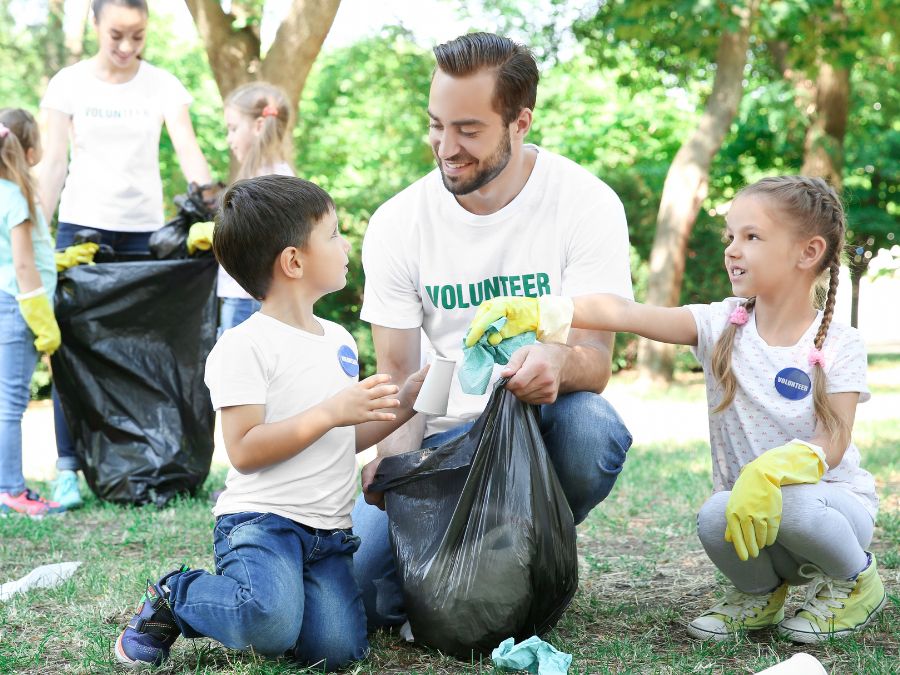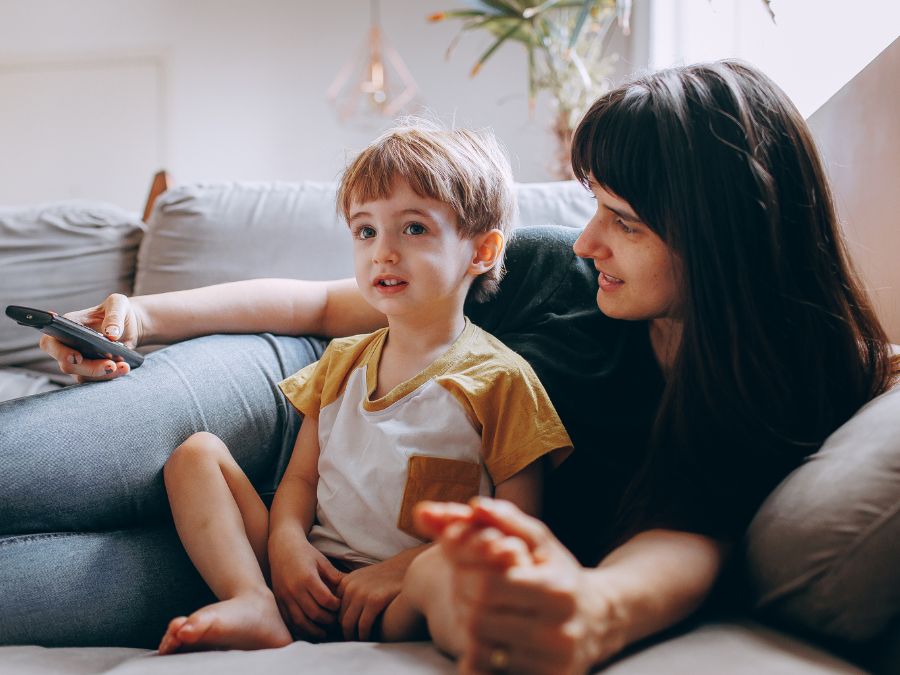
This interview was conducted by our high school summer intern, Nabeli Peña.
Can you introduce yourself and your work to our readers?
My name is Elliott Hinkle, and I use they/them pronouns. I am the principal and founder of Unicorn Solutions which is my independent consulting firm where I do training, consultation, facilitation, and advising. It really focuses on helping young adults that are impacted by systems, especially LGBTQ+ youth and young adults as well as the adults who support them. It is also informed by my own lived experience in systems such as child welfare and mental health, and as a queer and trans person. So anything that might help adults or young people directly have a better experience and better development of their futures is really what I am focused on and that work looks like all kinds of things.
What would you say is Unicorn Solutions overall focus?
The overall focus is youth and young adults impacted by systems. Some of the systems I have worked with are, child welfare, based on my own lived experience and mental health, as well as with the justice system or juvenile justice system and even with physical health. I’ve worked with doctors, nurses and other care providers who work with young people that may be entering foster care, who want help around how to best have conversations, especially sensitive conversations, with LGBTQ+ youth. I have even done some stuff with faith, faith groups, or groups that have some sort tangential faith connection. The Jesuit Volunteer Corps is one where I have gotten to help their volunteers get trained and have a better awareness of their gender and sexuality, as well as the people they may interact with.
I do a lot of training, trying to help people have an increased consciousness of what they think about and why do they think those things; maybe just getting more comfortable unpacking that and what it means in relation to the other people that they come into contact with. I am creating spaces where folks are willing to understand, be vulnerable, and reflect. Ideally, this internal work benefits all the other people that they will go and work with them. I have had some friends say that I am trying to bring some of the human back to the work and also make the work more understandable. That way, everyone can be a part of the change. Whether that is intentional or not that seems to be some of the impact I am having.
Over the past two years, what are all the ways that you have stayed involved with HOPE?
I am on the National Advisory Board as well as the Family and Community Experts Council (FACEs) and then presented a lived experience training at the Annual HOPE Summit. In general, helping advise and give some support to Allison Stephens from HOPE or other folks if they are looking for that. But really just staying involved with HOPE both in trying to better understand what HOPE is and what does it look like for me to incorporate it into my work. I bring HOPE into the conversations I am having elsewhere. So, when folks start talking about adverse childhood experiences (ACEs) it is a lot easier for me to say, “Okay, well, we should talk about that, but we should also talk about positive childhood experiences (PCEs)”. For me I think about, what are the ways to build positive resilience versus “wow, they have gone through so much trauma and they have resilience.” What are the ways we can help folks that do not go through the initial channel of harm, or ideally avoid major trauma but still build resilience for navigating life? And so, staying involved through the different boards and getting to help with the HOPE Summit was also a nice challenge for myself to tie some of those ideas together. I have also been able to use some of the HOPE content with some of the medical providers that I have worked with to give them some of the tools that have been created for them to think about how they’re talking with parents and families about these concepts.
How would you define HOPE and its impact?
I would define it as the response to ACEs that is needed. What are the ways that we are creating healthy opportunities and positive opportunities? And to be clear, not toxic positivity. What are the ways we are thinking about building up folks in a strength-based way. HOPE is a deeper dive of that and for the longest time I heard a lot about ACEs. It started to get to that place where I think there is stigma and frustration about the way that it could make the conversation go. Whereas HOPE is like, when someone brings you a problem and you want them to also bring a solution. How are we thinking differently about the work and moving beyond what is bad and what is hard to how we are going to make any change here. It has given me, funnily enough, hope in the work. Knowing there is another way we can be thinking about that. It has been helpful for me because my work maybe can feel really tender, emotional, and human. I needed PCEs to look and say, I think it is possible for us to do work differently, even during crisis.
How does childhood in a foster care environment translate into adulthood?
Big question, I think it can look like lots of things. For me, some of my time in care impacts my adulthood around not necessarily exiting care with permanent connections in the way that the child welfare system might define it. I was not adopted. I did not leave reunited with my family. I stayed connected to a foster parent I had, and I stayed connected to some adult supports that I had chosen. Maybe the state did not take the time to make some sort of formal arrangement, and in some ways, I think that was good, because I needed people who were going to stick around regardless of getting paid or having a formal agreement. Even as a queer person, it was just sort of expected that I would have to kind of create my own, as I call it fr-amily; friends who are family.
In adulthood, it shows up in different ways like navigating holidays. In some years it is a regular day and others can feel hard. Birthdays can be a weird time, but it also has given me a different view of relationships. I really think about how my friends make up so much of my life. I even went into a season of being single, just wanting to focus on getting to know the people in my world because there was not as much time spent there when I was younger. Being able to focus on friends, what I needed, and what stuff I had left over that needed to be worked through, was really helpful. But it also meant that, in high school and even now some of my priorities in comparison to people in my same age group look different. This is in ways that can be totally fine and other times can feel like “Oh yeah I wish I could have focused more on being a kid and worrying about prom instead of housing.” But that was what the circumstances called for.
I think it also can show up in how I have been able to create some really awesome connections to other people who have lived experience, while simultaneously trying to navigate any sort of stigma or pre-judgments folks might have about anyone in my community. Even my interactions with the medical system; what care did I receive or not, did anyone take the time to help me understand when you go to the primary care doctor and when you go to the ER, not really. And adults might not think about sharing that with a 15, 16, 17-year-old if you assume someone else must have taught them this, unless you have a checklist which may not feel like quality care either. Because of my lived experience, I have a different way of looking at the world, which I appreciate. As a person who also likes queer theory, I am already looking at the world through a questioning lens: “why is it this way?; is that the truth?; and who says so?”. It has given me an interesting lens of curiosity to navigate life.
Now that positive childhood experiences are more well-known, do you have ideas about giving children and families in the child welfare system increased access to positive childhood experiences?
Something I talk about now is the Trevor Project’s yearly survey, this year’s being the 2022 National Survey on LGBTQ Youth Mental Health. They buried the lead at the very bottom of this report, where they talk about sources of joy. They asked young people what are things that bring you joy. The list of things that they have there really gave me pause as they are so simple that some of it is, seeing happy, healthy, queer elders. That is a positive childhood experience seeing that represented, building a relationship with that person or persons. They also talked about going to drag shows, listening to music, seeing the people that look like them on TV, and lots of other things.
Sometimes we overcomplicate it, thinking that there needs to be an entire program or a policy actually when it may really be about creating an experience. It is when we can pause and not overcomplicate it and ask, “What are the things this person is interested in that I have in my realm of my networks to connect them too?” Ask youth this directly! That can be mentorship, shadowing opportunities, getting to be a part of a club at school or local community garden, there’s just so many options.
You are an expert in engagement for LGBTQ youth. Do you have any tips for organizations that support LGBTQ families to focus on strengths in an authentic way?
If I am going to focus on the strength of a family, and I know a family who has seemingly figured out how to authentically support their LGBTQ youth, I would ask them, “do you want to help other families get to where you are?” Sharing how they got there, creating conversational peer spaces and community spaces for folks to share ideas and resources. I have a friend who is a queer therapist who started a support group for LGBTQ youth and their families. If you have the capacity to do something like that, that can be a starting point to asking those families and youth, “what are the things that would feel helpful to you?” beyond anything we might read or watch. Even though I am considered an expert in these topics on how to engage my own community, I will not know what exact need someone in Ohio has which will be different from the needs of a family in Oregon. There may be similarities, but what you actually need day-to-day may look more focused on one need, whereas someone in another state or community might be focused on another. Being willing to engage with the Community itself and willing to ask them what their needs are, are two huge aspects that are fundamental to the engagement of any group of people.
You are also an expert in child welfare. In your first interview, you discussed the impact of race on the child welfare system and highlighted how powerful it can be for a child or youth to engage with social workers who look like them. How have you seen the conversation around race in child welfare change over the past two years? Or has it changed?
There was progress made and momentum that happened in 2020 around Black Lives Matter and George Floyd’s murder, as well as in 2021 after Cedric Lofton’s death that was later ruled a homicide while in a juvenile correctional facility. It really forced child welfare leaders and organizations to say we can’t not talk about it anymore. From that, some space was created to have these conversations and start initiatives, then it’s a matter of maintaining that. Staffing and budgets in many fields are seen as barriers to lasting change. This, for me, only underscores that we are not done, and the reality is that racism is deeply rooted in the US child welfare system.
I do think there is more nuance that is present in conversations on the local, state, and federal levels on all sides, but how do we continue to make it genuine? There is now more focus on how we can support children and their families in their home without removal.
If systems cannot meaningfully support all the individuals and families they set out to, then a new model is needed. Whether that is dismantling the system or setting it up in a different way, we have to be willing to acknowledge and respond if what we have done for so long is not working. That might mean instead of bringing more people in, we are figuring out how to let go of control and power. It is not lost on me that one of the biggest things that people often need, in a society where you have to pay to live, is money to address most immediate needs. They might also want the flexibility to decide what type of support will be most helpful, such as peer support (a relationship with a person with some shared lived experience who may best understand where they are at), counselors, case managers etc, all relationships to folks who can support them. Then of course resources (ie, often money) to actually do the things that they need to do for their children, youth, and families to survive. It is my hope we can get folks to a place where they are past surviving, and instead they are in their communities, with solid relationships and families, and ease of access to resources – thriving.


